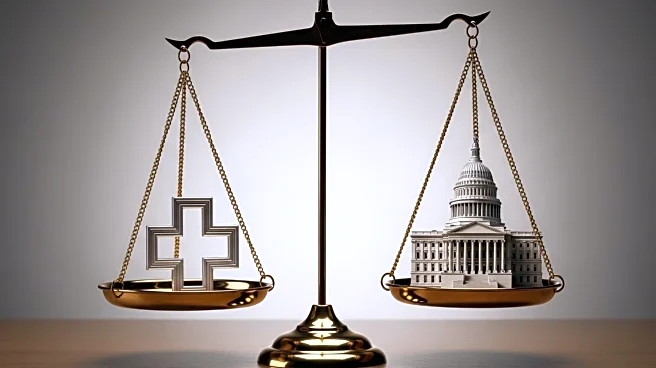What's Happening?
The U.S. Senate is currently embroiled in a standoff over the extension of subsidies that assist Americans in purchasing health insurance under the Affordable Care Act. This dispute is central to the ongoing government shutdown, with Democrats insisting on the renewal of these tax breaks as part of any funding measure to reopen the government. The subsidies, which were made more generous in 2021, have significantly increased enrollment in Affordable Care Act insurance, particularly in states like Florida, Texas, and Georgia. Without congressional action, these subsidies are set to expire at the end of the year, potentially doubling insurance premiums for many consumers. Democrats argue that immediate action is necessary to prevent millions from losing coverage and facing increased premiums, while Republicans are divided on the issue, with some supporting an extension and others opposing it.
Why It's Important?
The expiration of these subsidies could have a profound impact on the U.S. health insurance market, affecting over 20 million Americans who rely on them for affordable coverage. If the subsidies are not extended, insurance premiums could rise significantly, leading to a potential increase in the uninsured population. This could also result in higher costs for those who remain insured, as insurers may raise prices or exit the market due to reduced enrollment. The debate over these subsidies highlights broader issues in U.S. health policy, including the affordability and accessibility of health care. The outcome of this standoff could influence future legislative priorities and impact the political landscape, especially as public opinion shows strong support for extending the subsidies.
What's Next?
As the government shutdown continues, the Senate is expected to vote on dueling bills related to the funding measure. The outcome of these votes will determine the next steps in resolving the standoff. If the subsidies are not extended by November 1, when the shopping period for Obamacare plans begins, many consumers may face sticker shock and opt out of purchasing insurance. This could lead to further market instability and increased pressure on lawmakers to find a resolution. The political implications are significant, as both parties navigate public opinion and the potential consequences of their decisions on health care policy.
Beyond the Headlines
The debate over health care subsidies also raises ethical and legal questions about the role of government in ensuring access to affordable health care. The potential expiration of these subsidies could exacerbate existing inequalities in health coverage, particularly affecting low-income individuals and those in states with high enrollment in Affordable Care Act plans. Additionally, the discussion around fraud and the eligibility criteria for subsidies highlights ongoing challenges in administering health care programs effectively and equitably.








